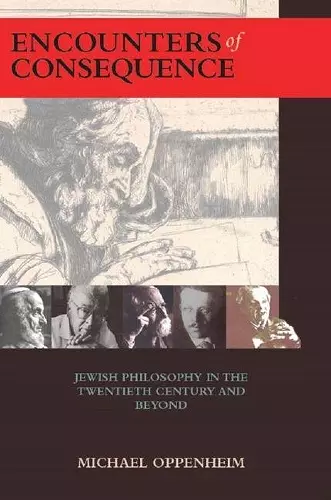Encounters of Consequence
Jewish Philosophy in the Twentieth Century and Beyond
Format:Hardback
Publisher:Academic Studies Press
Published:30th Oct '09
Currently unavailable, and unfortunately no date known when it will be back

This book provides an introduction and deeper analysis of the situation of Jewish philosophy in the last century and beyond. It charts Jewish philosophy's engagement with modernity and post-modernity along two overlapping axes; underlying issues and significant twentieth century Jewish philosophers. Throughout its history, modern Jewish philosophy has confronted such issues as: the nature of Judaism, Jewish identity, meaning, continuity, the value of remaining a Jew, authority and change in Jewish law, and the particular challenges of history (including the Holocaust), feminist Judaism, and religious pluralism. Featured are those philosophers of encounter: Franz Rosenzweig, Martin Buber, and Emmanuel Levinas, as well as Joseph Soloveitchik, Gershom Scholem, .Arthur Cohen, Eliezer Schweid, Emil Fackenheim, and Irving Greenberg.
“This book of essays is in Michael Oppenheim’s distinctive voice—intelligent, insightful, and sensitive to all the important issues. Always informed and thoughtful, Oppenheim brings out the best in his subjects. In his criticism, he always seeks to illuminate rather than score points, and in dealing with some of the significant thinkers of our time he makes a valuable and important contribution to all who are interested in modern Jewish thought." -- Rabbi Irving Greenberg, Past President of the Jewish Life Network, Past Chairman of the United States Holocaust Council
“Interweaving earlier articles into a new whole, Michael Oppenheim’s book advances and enhances each of his areas of focus: modern Jewish thought, philosophy, and feminism. A study of fascinating originality, Oppenheim explores conceptions of self and the self’s relations to others from the vantage point of the formative twentieth-century Jewish philosophers. Ultimately, it is Oppenheim’s measured sensibilities of comparison and rapprochement that make this volume valuable and unique.” -- Barbara E. Galli, professor, author, and translator of major works of Franz Rosenzweig
“Michael Oppenheim’s Encounters of Consequence is a wonderful collection of essays showcasing the principal Jewish philosophers of the modern period. He brings these thinkers into dialogue with others, highlighting some of the critical issues of our time. In translating their insights for our mutual understanding, discussion, and critique, Oppenheim opens a parallel door to the transformative critique of feminist theory and philosophy.” -- Norma Baumel Joseph, Professor of Women’s Studies and Jewish Studies, Department of Religion, Concordia University
"The 'encounters' to which Oppenheim (religion, Concordia U., Montreal) refers are ones between Jewish tradition and modernity, history, and other philosophies. In this collection of 15 articles — most previously published — major modern Jewish philosophers address issues with universal implications. Among those discussing questions of Jewish identity, faith, and the challenges of secularism, the Holocaust, and religious pluralism are Martin Buber, Gerhom Scholem, and Irving Greenberg. Differing views are presented, e.g., between Buber and Scholem on Hasidism. Prominent Jewish and non-Jewish thinkers are partnered in dialogs: e.g., Joseph Soloveitchik and Kierkegaard on "the lonely man of faith." The final chapter is devoted to Jewish feminist perspectives on justice, relationships, and gendered 'God talk.'" -- Annotation ©2010 Book News Inc. Portland, OR
"This collection of 15 reprinted articles by Oppenheim (Concordia Univ., Montreal) provides a scholarly introduction to major philosophers and events in Jewish philosophy from the 20th century to the present. The chapters define objectives, currents, and limits of modern Jewish thought on such relevant issues as Jewish fate and faith; the relationship between Jewish identity and Jewish law; Holocaust destruction and Zionist rebirth; and the challenges of feminism, secularism, and religious pluralism. Featured are several chapters dealing with views on God, man, self, and other as expressed in the writings of Franz Rosenzweig, Martin Buber, and Emmanuel Levinas; and reflections on Joseph Soloveitchik's lonely man of faith, Arthur Cohen and Emil Fackenheim's responses to the Shoah, Eliezer Schweid's Zionist philosophy, Irving Greenberg's dialectic of hope, and issues of Jewish feminism. Unfortunately, chapters are reprinted, not re-edited, and redundant thoughts and different spellings for the same word are detectable. Also, the various chapters differ in depth, quality, and relevance, no doubt a reflection of the time, audience, and genre of the original publication. However, in one way or another, the volume reflects adequately and effectively a plurality of approaches in uncovering a Jewish philosophy of encounter. Summing Up: Recommended. Upper-level undergraduates through researchers/faculty." -- Z. Garber, Los Angeles Valley College
ISBN: 9781934843673
Dimensions: unknown
Weight: 767g
432 pages